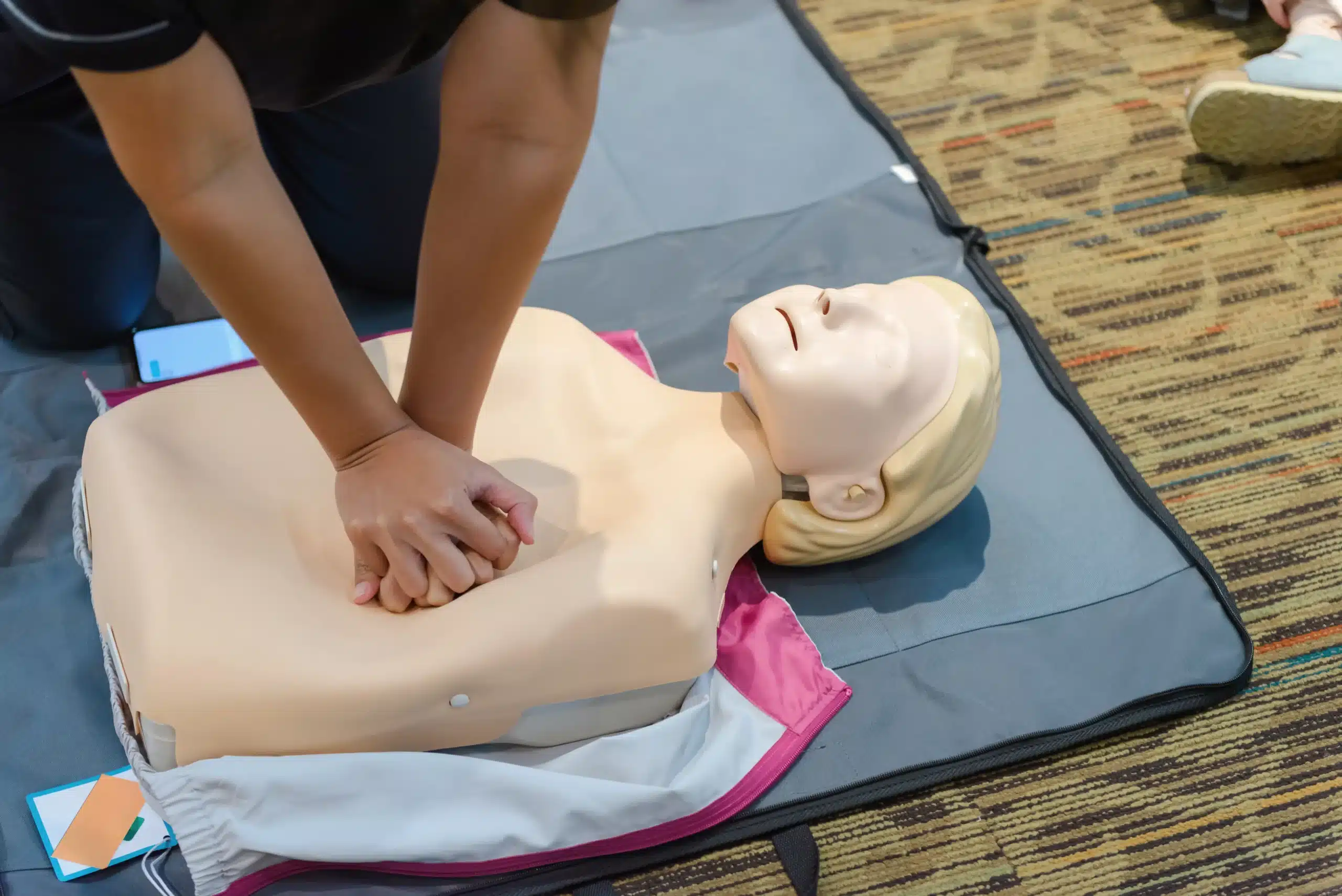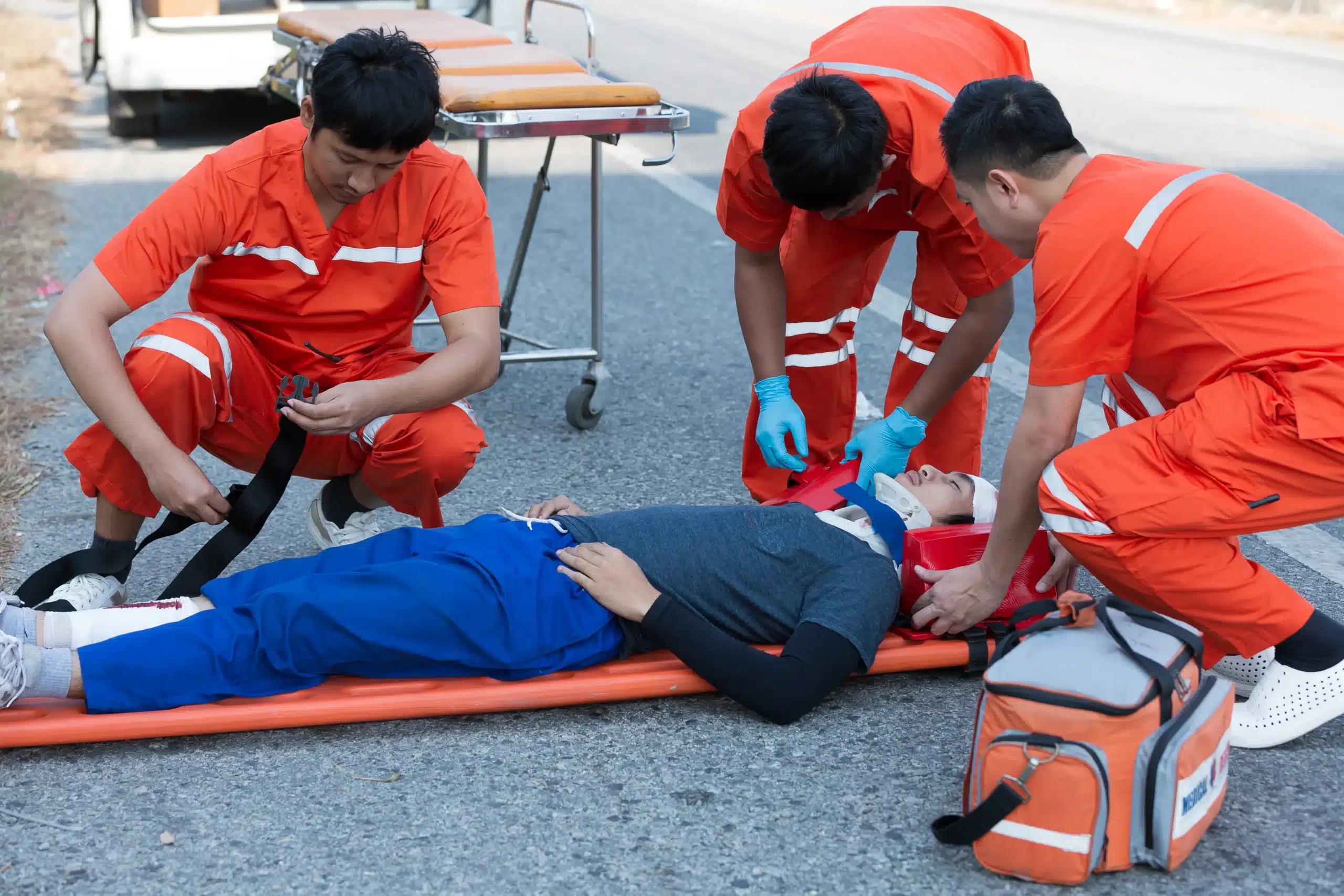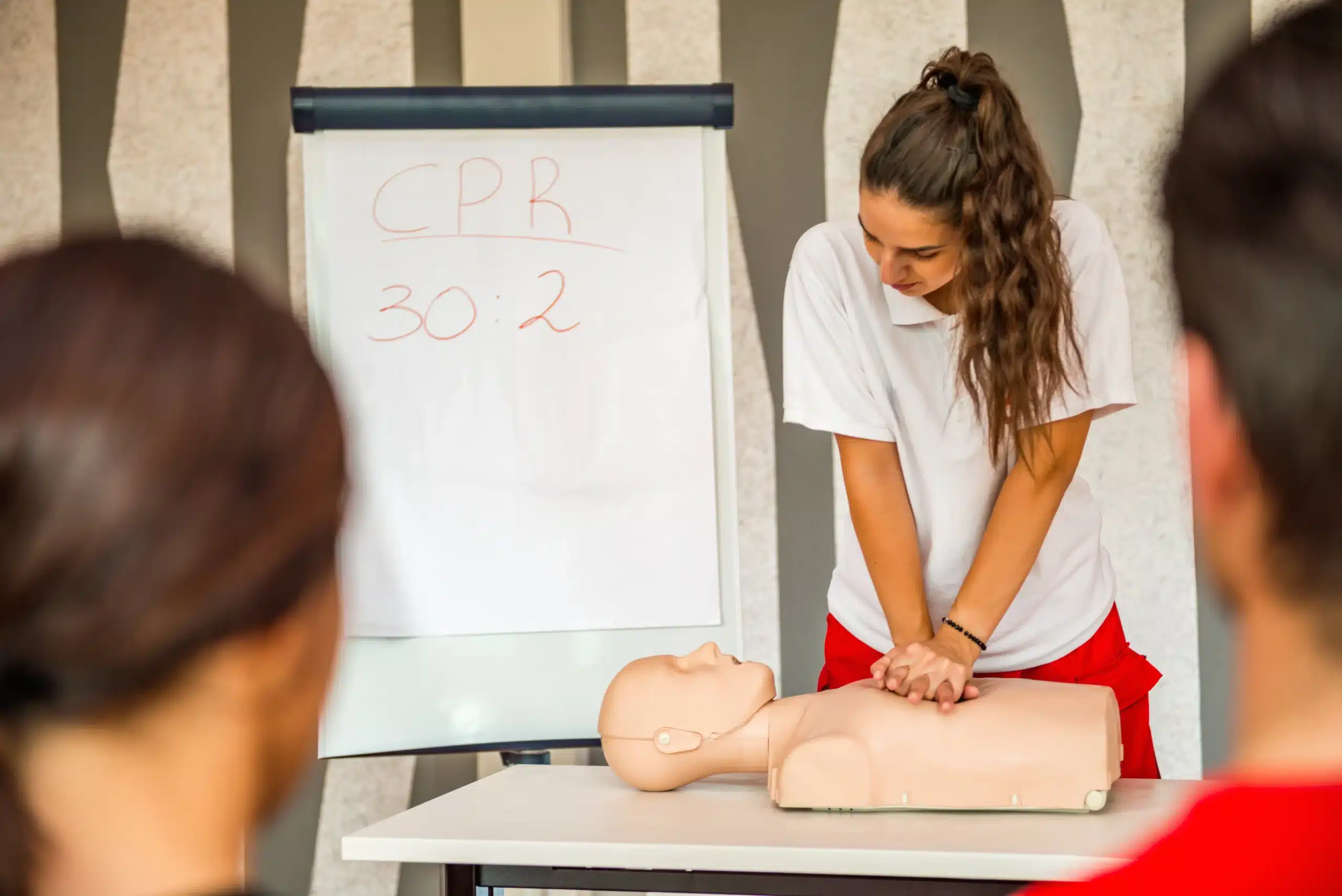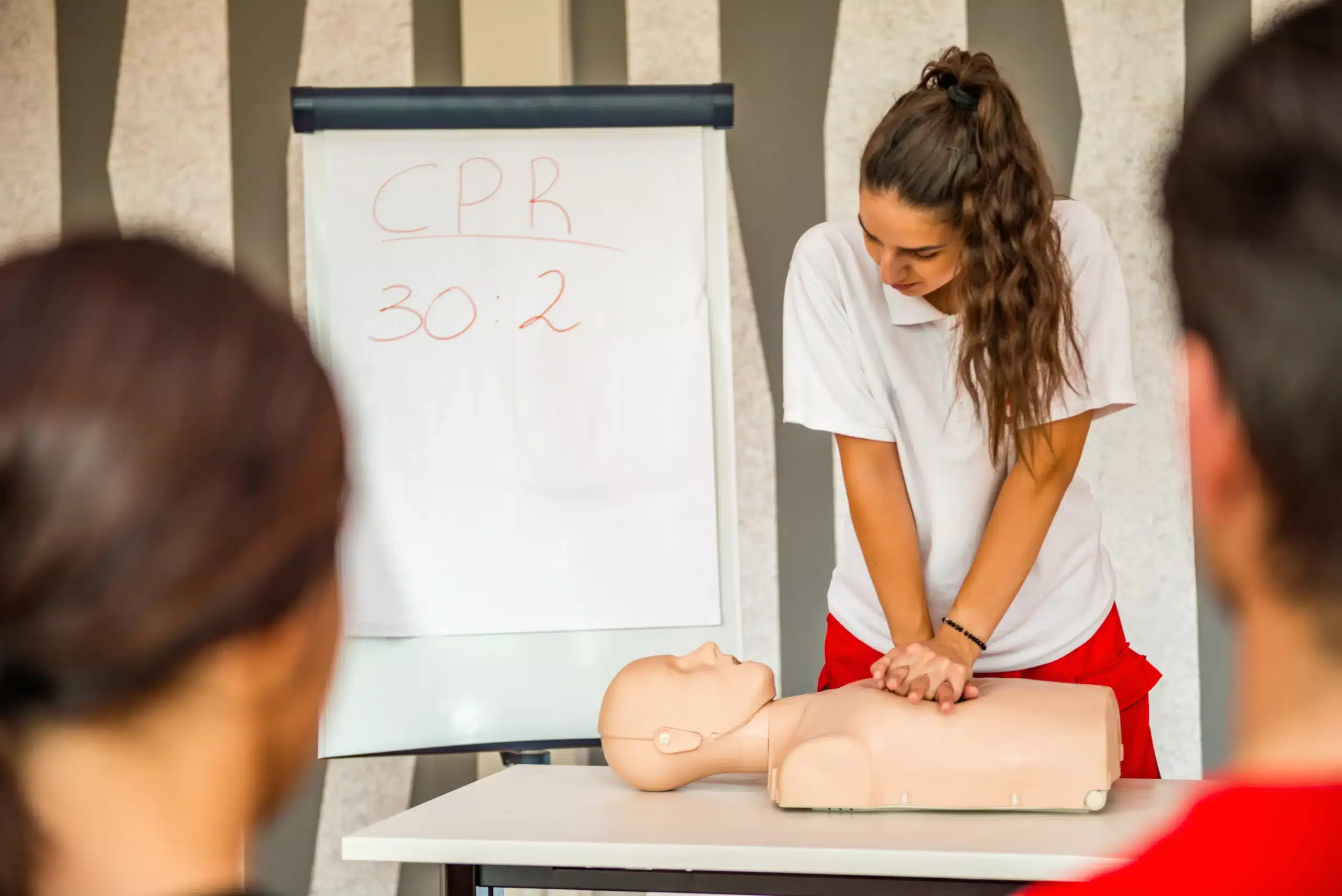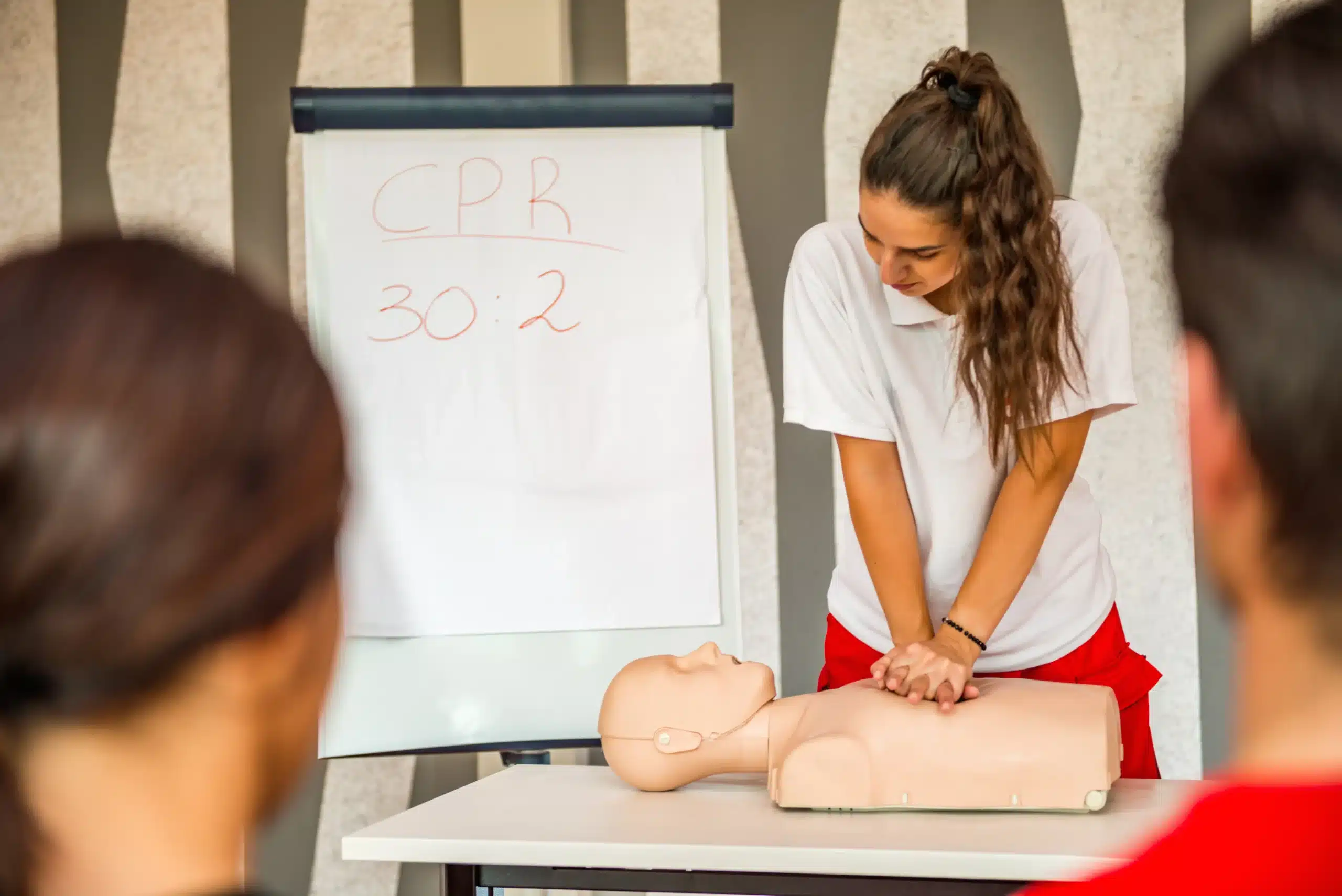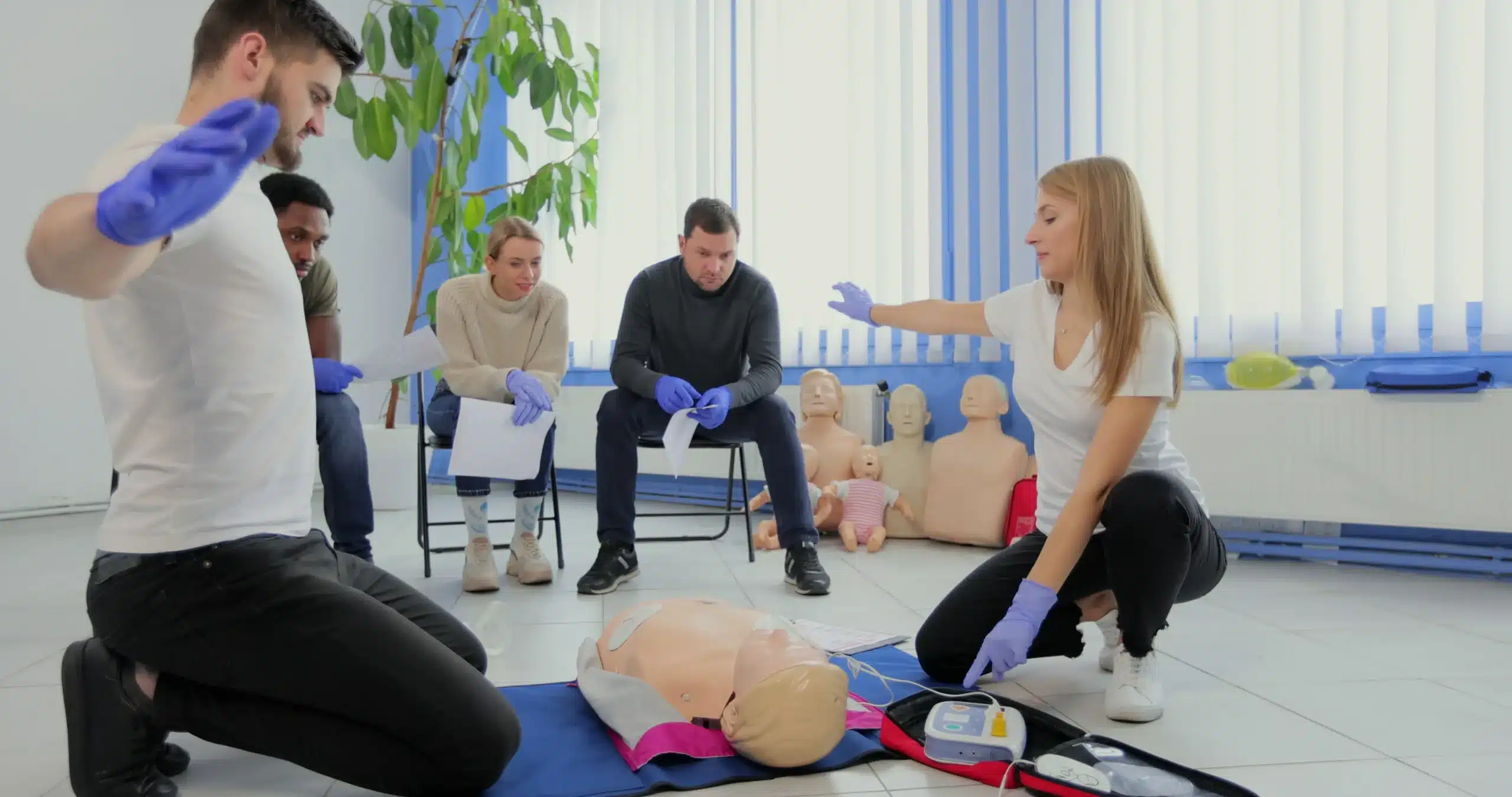In times of crisis, knowing CPR can make all the difference. It’s a skill that empowers you to act quickly and effectively when every second counts. This guide provides a complete overview of CPR, from its fundamental importance to the practical steps of finding and enrolling in CPR courses nearby. We’ll explore the different types of CPR certifications, including BLS, ACLS, and PALS, and help you choose the right one for your needs. Whether you’re a healthcare professional, a concerned parent, or simply someone who wants to be prepared, this guide will equip you with the knowledge and resources to find the perfect CPR training in Concord, Walnut Creek, or Pleasant Hill.
Key Takeaways
- CPR training empowers you to save lives: Equipping yourself with life-saving skills, from basic CPR to advanced certifications, enables you to respond effectively in emergencies. Find a course that aligns with your individual needs.
- Select the right CPR course for your goals: Consider your background and career aspirations when choosing a certification. Whether you’re a healthcare provider, caregiver, or community member, there’s a course designed to meet your specific requirements.
- Maintain your CPR skills through ongoing practice: Regular practice and refresher courses are vital for staying prepared and confident in your abilities. Keep your certification current and stay informed about the latest guidelines to provide optimal care in emergencies.
What is CPR and Why is it Important?
Cardiopulmonary resuscitation (CPR) is a life-saving technique used in emergencies when someone’s heartbeat or breathing has stopped. This can happen due to a heart attack, drowning, or other medical emergencies. CPR involves chest compressions and rescue breaths to circulate blood and oxygen to the brain and other vital organs. Learning CPR empowers you to respond effectively in these critical situations.
Think of CPR as a bridge. It helps keep someone alive until professional medical help arrives. Immediate CPR can dramatically increase a person’s chances of survival, sometimes doubling or even tripling their odds. More information on the impact of CPR and its importance in increasing survival rates can be found in our CPR certification guide. It’s a skill that can make a real difference. If you’re in Pleasant Hill, you can also find helpful resources and a CPR training guide specific to your area.
CPR Courses Near You
Finding the right CPR class can feel overwhelming, but it doesn’t have to be. This section breaks down the different types of CPR courses available in Concord, California, so you can choose the best fit. Whether you’re a healthcare professional, a concerned parent, or simply want to be prepared for emergencies, there’s a course for you. Concord CPR Classes offers a variety of options, conveniently located for residents of Concord, Walnut Creek, and Pleasant Hill.
BLS
The Basic Life Support (BLS) course provides healthcare providers and other professionals with the skills to respond to life-threatening emergencies. It covers core CPR techniques for adults, children, and infants, along with AED use and relieving choking. BLS certification is often a job requirement for healthcare professionals, including doctors, nurses, and paramedics.
ACLS
Advanced Cardiovascular Life Support (ACLS) training builds upon the fundamentals of BLS. This course is designed for healthcare professionals who manage cardiopulmonary arrest and other cardiovascular emergencies. ACLS covers advanced airway management, pharmacology, and team dynamics during resuscitation.
PALS
The Pediatric Advanced Life Support (PALS) course focuses on the specialized needs of infants and children in emergency situations. It equips healthcare providers with the knowledge and skills to effectively manage pediatric respiratory and cardiac emergencies. PALS certification is essential for pediatricians, nurses working in pediatric units, and other healthcare professionals who regularly care for children.
First Aid/CPR Combo
Combining CPR and first aid training provides comprehensive life-saving skills. This course covers essential first aid techniques for common injuries like burns, cuts, and fractures, along with CPR skills for adults, children, and infants. A combined course is a great option for anyone who wants to be prepared for a wide range of emergencies. Check out Concord CPR Classes’ first aid training options to learn more.
Heartsaver CPR/AED
Heartsaver CPR/AED courses are designed for anyone with limited or no medical training who needs a CPR/AED certification. This includes teachers, coaches, childcare providers, and other community members. These courses focus on core CPR skills and how to use an automated external defibrillator (AED). Consider Heartsaver First Aid CPR AED for even more comprehensive training.
CPR Certification: Options and Renewal
Choosing the right CPR certification depends on your specific needs. Several reputable organizations offer CPR training, each with its own standards and guidelines. Let’s explore some of the most common options.
American Heart Association
The American Heart Association (AHA) is a leading authority in CPR training and certification. Concord CPR Classes offers AHA-certified courses, known for their comprehensive approach and focus on high-quality instruction. These certifications are widely accepted and often preferred by healthcare providers and professionals in related fields. AHA certifications equip you with the latest life-saving techniques and ensure you’re prepared for various emergency situations.
Red Cross
The American Red Cross also provides a range of CPR courses designed to meet different needs. These courses adhere to OSHA standards (for in-person classes), making them a suitable choice for many workplaces. Red Cross certification is widely recognized and respected, offering a solid foundation in CPR skills and knowledge.
Other Certifications
Beyond the AHA and Red Cross, other organizations offer CPR training and certification. Concord CPR Classes provides a variety of options, including Basic Life Support (BLS), Advanced Cardiovascular Life Support (ACLS), and Pediatric Advanced Life Support (PALS), catering to various levels of expertise and career paths. Exploring these different certifications can help you find the perfect fit for your individual requirements. Contact us to learn more about the certifications offered at Concord CPR Classes.
How Long is Certification Valid?
Most CPR certifications, including those from the AHA and Red Cross, are valid for two years. Renewal is essential to stay current with the latest CPR guidelines and maintain your skills. Regular CPR training ensures you’re prepared to respond effectively in emergencies and provide the best possible care. Check with your certifying organization for specific renewal requirements and recommendations.
Find CPR Courses Near You
Ready to learn CPR? Finding the right course near you is easier than you think. Whether you’re a healthcare professional needing recertification or a parent wanting to learn essential lifesaving skills, there are several ways to find a class that fits your schedule and needs.
Online Search Tools
Start your search online. Most training providers list their course schedules on their websites. For example, In-Pulse CPR recommends checking their online calendar for the most up-to-date class availability. A quick search for “CPR classes near me” can also turn up local options.
Local Training Centers
Many communities have dedicated training centers that offer a variety of CPR courses. For instance, Concord CPR Classes provides everything from basic CPR and First Aid to more advanced certifications like BLS, ACLS, and PALS. Check with training centers in your area to see what they offer. Concord CPR Classes serves the Concord, Walnut Creek, and Pleasant Hill communities.
Community CPR Courses
Your local community may also offer CPR courses through organizations like the YMCA, community centers, or hospitals. These courses are often designed for the general public and can be a great way to learn basic lifesaving skills. Check with your local community organizations for upcoming courses. Concord CPR Classes is a good example of a local provider offering community-based courses.
Registering for a Course
Once you’ve found a course that works for you, registration is usually straightforward. Most training centers, including those certified by the American Heart Association, have online registration systems. You’ll likely need to provide some basic information and choose a class date and time. Contact the specific provider for details on their registration process and any required paperwork.
What Happens in a CPR Class?
CPR classes blend theory and hands-on practice to equip you with life-saving skills. While specifics vary depending on the course type (like BLS, ACLS, or PALS), here’s a general overview of what to expect.
Class Length and Structure
CPR courses range from a few hours for basic CPR and first aid to longer sessions for more advanced certifications. Expect a combination of lectures, demonstrations, and hands-on practice. Instructors typically present information on recognizing emergencies, providing CPR for adults, children, and infants, and using an AED. Concord CPR Classes offers a range of courses, including BLS, ACLS, and PALS certifications.
Hands-on Practice
The core of any good CPR class is hands-on training. You’ll practice chest compressions and rescue breaths on mannequins, simulating real-life scenarios. These simulations offer immediate feedback, allowing you to refine your technique and build confidence. Many courses also cover choking relief and other first-aid basics. For more information on the benefits of simulations in CPR training, check out this helpful resource.
Tests and Evaluations
Most CPR classes include a written exam and a practical skills test to ensure you’ve grasped the material. You’ll demonstrate your CPR technique and knowledge of emergency procedures. Keep in mind that the validity of CPR certifications depends on the certifying organization and the specific course. This article provides further information on CPR certification validity.
Feedback and Simulations
Instructors provide personalized feedback throughout the course, helping you improve your skills and address any questions. Modern CPR training often incorporates advanced simulations and electronic feedback devices, offering detailed insights into your performance and further enhancing the learning process. This immediate feedback is invaluable for reinforcing correct techniques and boosting your confidence in providing effective CPR. Learn more about the importance of feedback in CPR training from this resource.
CPR Class Costs & Discounts
Knowing the typical costs associated with CPR certification can help you budget effectively and find the best value for your training. Let’s break down the general price range and explore some smart ways to save.
Typical Prices
CPR certification costs vary depending on the level of training and the certifying organization. Basic CPR courses typically range from $50 to $150. More advanced certifications, such as ACLS (Advanced Cardiovascular Life Support) or PALS (Pediatric Advanced Life Support), or those that include comprehensive first aid training, can cost $200 or more. This pricing generally covers training materials, instructor fees, and the certification exam. Prices can differ based on location and the specific training center.
Group Discounts
If you’re training a group of people, such as coworkers or community members, explore group discounts. Many CPR training providers, including Concord CPR Classes, offer reduced rates for group bookings. This can be a cost-effective way to provide high-quality training while saving money. Contact providers directly to discuss group rates.
Employer-Paid Training
In many industries, particularly healthcare and those with safety-sensitive positions, employers often cover CPR training costs for their employees. This is sometimes mandated by workplace regulations or company policies. Check with your human resources department to see if your employer offers this benefit. Even if it’s not a requirement, some employers recognize the value of trained employees and may subsidize or fully cover the cost of your CPR certification.
Choose the Right CPR Course
Knowing which CPR course best suits your needs depends on your background and goals. Whether you’re a healthcare provider, a parent, or simply want to be prepared for emergencies, different courses offer specialized training.
For Healthcare Professionals
Healthcare professionals often require advanced life support training. Courses like Basic Life Support (BLS), Advanced Cardiovascular Life Support (ACLS), and Pediatric Advanced Life Support (PALS) are crucial for doctors, nurses, paramedics, and other medical personnel. These certifications equip professionals with the skills to handle cardiac arrest, strokes, and other emergencies in a clinical setting. Concord CPR Classes offers all of these courses, ensuring healthcare providers in Concord, Walnut Creek, and Pleasant Hill have access to high-quality training.
For Parents and Caregivers
For parents, caregivers, teachers, and other community members, a basic CPR and First Aid course is an excellent choice. These courses cover essential life-saving techniques for infants, children, and adults. Knowing how to respond to choking, breathing emergencies, and other unexpected incidents can significantly impact the safety and well-being of those you care for. While not as advanced as BLS, ACLS, or PALS, these courses provide a solid foundation in essential life support skills. Consider CPR and First Aid training to gain confidence and preparedness for a range of situations.
Workplace Requirements
Many workplaces require employees to maintain current CPR certification. This is especially common in healthcare, education, and childcare settings. Check with your employer to understand their specific requirements. CPR certification is typically valid for two years, after which renewal is necessary. Concord CPR Classes offers convenient renewal courses to help you stay compliant with workplace standards and maintain your life-saving skills. Contact Concord CPR Classes to find a renewal course that fits your schedule.
Local vs. Online CPR: Which is Better?
Deciding between local and online CPR training is a common question. Both have their pros and cons, so the best choice depends on your learning style and specific needs. Let’s break down the key differences to help you decide.
Hands-on Learning
One of the biggest advantages of in-person CPR training is the hands-on learning experience. Practicing compressions and rescue breaths on a manikin provides immediate feedback, allowing you to adjust your technique in real-time with guidance from a certified instructor. This tactile experience builds muscle memory and confidence—crucial for effective CPR in a real emergency. While some online courses incorporate video demonstrations, they can’t fully replicate the kinesthetic learning of a live class. This physical practice is essential for developing the skills and confidence to perform CPR effectively under pressure.
Local Emergency Procedures
Local CPR courses, like those offered in Concord, often incorporate region-specific emergency procedures. Instructors can tailor the training to address local protocols and common emergency scenarios in your area. This localized knowledge can be invaluable in a real-life crisis. Plus, learning alongside others in your community creates a sense of shared preparedness. Knowing how to access local emergency resources and understanding regional protocols can make a significant difference in a time-sensitive situation.
Instructor and Peer Interaction
In a traditional classroom setting, you benefit from direct interaction with the instructor and your peers. You can ask questions, get personalized feedback, and learn from others’ experiences. This collaborative environment fosters a deeper understanding of CPR principles and techniques. The immediate feedback from an instructor, combined with the chance to observe and learn from classmates, can significantly improve the quality of CPR performance. While online forums offer some interaction, they lack the immediacy and personalized guidance of a live instructor. This direct interaction can be especially helpful for clarifying complex concepts and addressing individual learning needs.
Top CPR Training Providers
Finding the right CPR training provider is crucial for receiving high-quality instruction and a recognized certification. Several reputable organizations offer CPR courses, each with its own strengths. Here’s a closer look at some leading CPR training providers:
American Heart Association (AHA)
The American Heart Association sets the standard for CPR training. Their courses are widely accepted, often a requirement for healthcare professionals. The AHA offers a range of courses, from Basic Life Support (BLS) to Advanced Cardiovascular Life Support (ACLS), known for their rigorous training and emphasis on evidence-based practices. AHA certification ensures you receive top-tier instruction.
American Red Cross
The American Red Cross is another respected provider of CPR training. They offer various CPR classes for different needs, including basic CPR and first aid training. Their certifications are recognized nationwide, making them a reliable choice for individuals and organizations. The Red Cross also plays a vital role in disaster relief and community health initiatives.
National Safety Council
The National Safety Council offers comprehensive safety training programs, including CPR and first aid. With a focus on workplace safety, their courses often cater to businesses training employees in essential life-saving skills. They provide various learning formats, including online and in-person options.
ProTrainings
ProTrainings is known for its flexible online CPR training. This accessibility makes it convenient for those with busy schedules or limited access to in-person classes. They offer various courses and certifications for different learning styles and needs.
CPR Select
CPR Select offers a range of CPR certification courses, with costs varying based on the training type and provider. They focus on providing affordable and accessible training, making it easier for individuals to get certified. Their straightforward pricing and comprehensive courses make them a practical choice.
SureFire CPR
SureFire CPR provides various CPR training classes, often with discounts for specific groups like hospitals and nursing students. Their commitment to quality training at a competitive price makes them a popular choice, especially within the healthcare community. They offer flexible scheduling and convenient locations.
Concord CPR Classes
Concord CPR Classes offers a wide range of courses, including BLS, ACLS, and PALS certification. Serving Concord, Walnut Creek, and Pleasant Hill, they cater to both individuals and healthcare providers. Their comprehensive approach, combined with affordability and flexible scheduling, makes them a valuable resource. They also offer discounted group rates and the American Heart Association’s RQI program for quick certification.
Keep Your CPR Skills Sharp
Knowing CPR can help you save a life, but it’s not a skill you learn once and forget. Guidelines and best practices change, so staying current with your training is essential. This section covers how to keep your CPR skills sharp and ready for a real emergency.
Stay Up-to-Date
CPR certifications expire, typically after two years, as highlighted by ProCPR. An expired certification might not meet requirements for certain jobs. Keeping your CPR certification current ensures you’re officially recognized as someone qualified to help in a crisis. Staying informed about the latest guidelines is crucial for providing effective assistance when it matters most, as explained by CPR Classes Near Me. Regularly reviewing resources like the American Heart Association website can help you stay informed about any updates.
Practice and Refresher Courses
Even if your certification is current, regular practice is key. Consider refresher courses to brush up on your skills and learn about any updated procedures. CPR Certification Now emphasizes the importance of these renewal classes for maintaining your skills and confidence. Think of it like any other important skill—consistent practice makes you more effective and confident in a real-life situation. Health Education Pro reinforces this, stating that ongoing training is vital for anyone with a CPR certification. Look for local CPR renewal courses or consider online practice modules to keep your skills sharp. At Concord CPR Classes, we offer a variety of CPR training courses to help you stay up-to-date and confident in your abilities. Regular practice and refresher courses ensure you’re always prepared to respond effectively in an emergency.
Related Articles
- Why CPR is Important in Healthcare – Concord CPR Classes
- CPR Certification Near Me: Your Complete Guide – Concord CPR Classes
- CPR Recertification Near Me: Your Complete Guide – Concord CPR Classes
- Choosing the Right CPR Center: Your Guide to Life-Saving Training – Concord CPR Classes
- Why CPR is Critical in Healthcare
Frequently Asked Questions
What are the different types of CPR courses available? Several CPR courses cater to different needs. Basic Life Support (BLS) is geared towards healthcare providers, while Heartsaver courses are designed for the general public. Advanced certifications like ACLS and PALS focus on specialized life support techniques for adults, children, and infants. First Aid/CPR combo courses offer comprehensive training in both areas. The best choice depends on your specific requirements and goals.
How do I choose the right CPR certification? The right CPR certification depends on your individual circumstances. Healthcare professionals typically require BLS, ACLS, or PALS certification. If you’re a parent, teacher, or simply want to be prepared for emergencies, a basic CPR/AED or First Aid/CPR course might be sufficient. Consider your workplace requirements and personal goals when making your decision. Contacting a training provider like Concord CPR Classes can help you determine the most suitable option.
How much does CPR certification cost, and are discounts available? CPR certification costs vary based on the course type and provider. Basic courses typically range from $50 to $150, while more advanced certifications can cost more. Many providers offer discounts for group bookings, and some employers cover the cost of training for their employees. Check with your employer and chosen training center for potential cost savings.
Where can I find CPR classes near me? Finding a CPR class is easy. Use online search tools, check with local training centers like Concord CPR Classes, or inquire about community courses offered by organizations like the YMCA or local hospitals. Many training providers have websites with course schedules and online registration options.
What can I expect during a CPR class? CPR classes combine classroom instruction with hands-on practice. You’ll learn how to recognize emergencies, perform CPR on adults, children, and infants, and use an AED. Expect demonstrations, practice sessions on mannequins, and feedback from instructors. Most classes include written and practical exams to assess your skills and knowledge.


